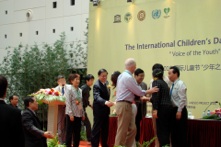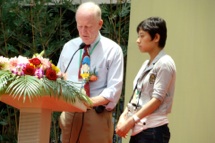

A presentation I was invited to give at an UNESCO International Children’s Day Event at the World Expo on I June, 2010. The planning and officious posturing of the event itself will receive further comment in a forth-coming Dispatch from China.
Sustaining Youth
David B. Sutton, Ph.D.
Saturday, June 26, 2010
A NEW GENERATION
We are here to celebrate a new generation of young environmentalists. With each generation we vest our hopes in them to do it better than we have done before.
It is a joy to be with kindred spirits again – with the budding idealism and unbridled enthusiasm and the faith in human nature of youth. It is, indeed, what kept me going in teaching for so many years.
I am a child of the 60’s – that was the time of the birth and flowering of the environmental movement in US and I can remember when I was the age of these students bristling with enthusiasm and energy to make the world a better place. After receiving the encouragement of my environmental elders to carry on what they had begun, I decided to devote my life’s work to more sustainable living on this beautiful planet.
MIND POLLUTION
Many years ago, it was during the first Earth Day (1970) and I was just beginning my teaching career at the University, I was asked to name our most serious environmental problem. Then the concerns in the press and the public mind were, air pollution, the poisoning of our food and water, and the loss of forests and biodiversity. Few were talking about global warming, although knowledge of it had been known for a hundred years. So you can imagine the questioner’s shock when I singled out “Mind Pollution.” as the most dangerous environmental problem.
Definition Slide.
Simply defined: Mind Pollution is the contamination of thought by out moded, myopic, selfish, and ultimately suicidal ideas about our relation to our environment and to one another.
Mind Pollution was and remains the ultimate cause of all other environmental problems.
I went on to explain the origin of this mental contamination from the curious religious beliefs that confers human dominion over all on earth, to success in conquering one frontier after another and the increasing power of technology over nature.
Mind pollution is about forgetting that we are members, not the masters, of the intricate skein of living and non-living things we call the environment and that human welfare depends on the welfare of the whole.
Forgetting something that we once knew… which I will return to later.
As the famous naturalist Aldo Leopold put if over 60 years ago (2):
SLIDE
“Civilization has so cluttered elemental man-earth relation with gadgets and middlemen that awareness of it is growing dim. We fancy that industry supports us, forgetting what supports industry.”
Leopold is reminding us that we need to appreciate our place in Nature and our absolute dependence on the natural processes that sustain us. Technology may give us the tools to more effectively interact with natural process but brute force technology forced upon the living landscape is not wise “scientific development” and certainly not sustainable.
All of this, of course, is second nature to the Taoist who knows it in their bones that we are inextricably connected to Nature’s ebb and flow.
In China, the indigenous natural philosophy was replaced by the human contrivance of a Confucian heavenly order. In the West, it was the fictitious conventions of Divine Providence and the market’s “invisible hand” that supposedly orchestrates things for the common good. The simple fact is (and should be blatantly obvious now with the present global economic meltdown) that we are in the grip of the flawed surreal economic worldview, where everything is commodity and human greed and device have no limit. We have lost the Way. Mind pollution still prevails.
SUSTAINABILITY
What does this have to do with “sustainability?”
Sustainability is and always will be fundamentally an ecological concept of limits. Like all living things, the human species and their systems of operations must adapt to the limits of earth’s natural life-support systems. All the human device and accord in the world cannot transcend those limits.
Human industrial and economic systems are not sustainable. In a finite world the one-way industrial processes of extract, make, use and throw-away must end. There is a limit to resources available as well as the capacity for the earth’s life-support systems to absorb the impact. The myriad of environmental problems we are experiencing today is a manifestation of reaching these limits. Calls for moving towards sustainable development come from such an understanding.
Sustainable Development is not about technology and economics; it is about a state-of-mind. It is about having a mind clear of mind pollution – one that remembers what we all once knew.
Sustainable living is mindful living – being conscious of how we are involved with, how we affect and are totally dependent upon our planet’s life-support systems.
CHILDREN KNOW
I want to suggest that we are all born with a fundamental understanding of our connection with nature – it is part of our evolutionary memory as a species and that this mindfulness is present in the innocence of youth.
Each generation helps us remember what we all once knew but have forgotten.
Young vibrant minds are filled with instinctual wisdom, inspiration and creativity. We need to listen to the inherent clarity of what they say.
Like the World’s indigenious people, children know we are connected to Nature. I have spent some time with an indigenous people of the high Andes mountains in Peru. The Quer’o are direct descendents of the Inca. There is no doubt in their mind that they are absolutely dependent on the Earth’s bounty for their continued existence – and they show it daily in rituals and ceremonies giving thanks for the gifts of life. They are illiterate and unschooled but THEY KNOW, like the Taoist, they know it in their bones.
So I want to suggest that we are all born with most of what we really need to know and the rest, as educator Robert Fulghum has so wonderfully written, we learned in Kindergarten (3).
“Most of what we really need to know about how to live, and what to do, and how to be, we learned in kindergarten,” He wrote. Wisdom is not at the top of the graduate school mountain, but there in the sandbox at nursey school.
These are the things we learned there. Share everything. Play fair. Don’t hit people. Put things back where you found them. Clean up your own mess. Don’t take things that aren’t yours. Say you’re sorry when you hurt somebody. Wash your hands before you eat. Flush. Warm cookies and cold milk are good for you. Live a balanced life. Learn some and think some and draw and paint and sing and dance and play and work every day.
When you go into the world, watch for traffic, hold hands, and stick together. Be aware and Wonder. Goldfish and hamsters and white mice and even the little seed in the plastic cup — they all die. So do we.
Everything you need to know is there somewhere. The Golden Rule and love and basic sanitation, ecology and politics and sane living.
Think of what a better world it would be if we had a basic policy in our nation and other nations to always put things back where we found them and cleaned up our own messes… And it is still true, no matter how old you are, when you go out into the world, it best to hold hands and stick together.
But this clarity and insight is soon lost. It is only a matter of time before this instinctual wisdom (that we are all born with) is educated out of us. And it is our responsibility that that does not happen to our new generations of clear-minded youth.
OUR RESPONSIBILITY
Having devoted the majority of my professional career to teaching at the University it pains me to have to say that much of the education of our youth has become a major source of mind pollution.
Case in point—“economics” and advancement into an MBA program have become the most sought after education for our best and brightest…. The study of economics provides little if any insight into human’s place in the natural world. It has only been recent that notions of environmental limits and impact as well as social equity and community responsibility are being included and then only superficially.
It is my opinion that an almost exclusive obsessive pre-occupation with an economic worldview is the major source of present-day mind pollution.
Virtually every head of state in the world has his or her Council of Economic Advisors. None that I know of has a Council of Ecological Advisors. Think how different the world might be if they did.
Each new generation serves as “the hope of the future” and I suspect that this has always been so. Yet, with generation after generation we see that hope dashed as they each become assimilated into the adult world. The youthful vitality, joy and exuberance for life is systematically extinguished in most of our youth.
Through teaching and example they learn the futility of confronting the status quo and the cost of rebellious thought and behavior. A cost that most chose not to bare. After all ‘the best and the brightest” have taught them that personal cost and benefit is all there is – nothing else matters – it’s the way things are, its human nature so why fight it.
Modern society commits the most egregious debilitating crime against its blossoming young humanity — Stunting their growth from the vibrant, compassionate instinctively wise beings they were born be to get them in step as compliant consumers and cogs in the wheels of commerce.
Youth is our hope — Supporting them is our responsibility.
We need to grant them immunity from further mind pollution. We need to spare them the contamination of ill-conceived notions of reality and wishful thinking. We need to be responsible for what we are teaching them and to support their efforts of undoing what we have wrought.
Hope in this predicament lies in the possibility that the same intelligence and resourcefulness that threatens the environment can be enlisted in the tasks of repair and reconstruction. These resources need to be employed not just in repairing the physical damage but in reconstructing our vision of ourselves in the natural world—of the very way we think – of what we teach.
“For life on this planet, it is the ecologists, and not the bookkeepers of business, who are the ultimate accountants.”
—Stewart Udall (4)
David B. Sutton 沙乐明, Ph.D is a human ecologist, writer and international consultant specializing in, ecological conservation, sustainable development, integral health and creative communications. He has over twenty-five years experience teaching at the University level. At Stanford University, he lectured on international conservation and development issues and the led the Stanford Alumni Seminar in India and Nepal. He was a principal instructor in the training of trainers for Sweden’s, The Natural Step in the USA.
For the past eight years he has lived and worked in Shanghai where he writes, lectures and is often engaged as a commentator on TV and for workshops and conferences. He was recently featured in the BBC series, “Hot Cities: Counting the Cost” filmed in Shanghai. Dr. Sutton is currently documenting notable examples of sustainable technologies and urban best practices at the World Expo.
Notes:
(1) Presentation for International Children’s Day at UN Pavilion
World Expo, sponsored by UNESCO and Soong Ching Ling Foundation, June 1, 2010.
(2) Aldo Leopold, “A Sand County Almanac,” 1949
(3) Robert Fulghum, “All I really need to Know I learned in Kindergarten,” 1988
(4) Steward Udall was Secretary of Interior under President John F. Kennedy